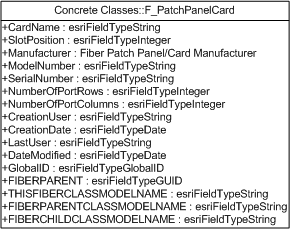

| Appendix > Fiber Manager Data Model > PatchPanelCard |
Version: 10.1 |
The Patch Panel Card is the piece of hardware that is inserted into a patch panel and it contains one or more optical ports. From a data model perspective the card forms a convenient “container” to group a collection of ports within a patch panel. The card does not have many distinct characteristics beyond this purpose.
|
Attributes (required fields in red): CardName: text - This field stores the unique identifier of the card within the patch panel. This is used so organizations can uniquely identify cards in any order, pattern or naming convention. SlotPosition: long integer - This field uses the standard Fiber Manager position management scheme to hydrate the position of slots in the application and reports. Position 1 will be located in the upper left hand corner in the patch panel configuration. Manufacturer: text - This field stores the name of the company that built the patch panel card. It is important for some organizations to know that the cards and patch panels are made by the same manufacturer, because mixing manufacturers can cause problems in some systems. This field may be too much detail for many organizations to store in their GIS. There is no functionality tied to this field, so it can be deleted if it is not useful. The Fiber Patch Panel/Card Manufacturer domain is assigned to this field. |
 |
ModelNumber: text - This is the model number of the Patch Panel Card. This field will only be useful to some organizations. If this field does not provide direct benefits from storing this information in the GIS, it should be removed.
SerialNumber: text - This is the serial number of the Patch Panel Card. This field will only be useful to some organizations, and it may be difficult to actually collect this information. If this field does not provide direct benefits from storing this information in the GIS, it should be removed from the model.
NumberOfPortRows: long integer - This field uses the standard Fiber Manager position management scheme to determine the number of positions in the Y axis of the configuration. This can be thought of as the number of shelves in a book shelf.
NumberOfPortColumns: long integer - This field uses the standard Fiber Manager position management scheme to determine the number of positions in the X axis of the configuration. This can be thought of as the number books on the shelves in a book shelf.
GlobalID: GlobalID - This field contains a unique number (GUID) that is generated and maintained by ArcGIS. This value is used for all relationships in the ArcFM data model and is required for Fiber Manager to function properly.
FiberParent: GUID - This field contains the GlobalID of the parent object to the current object.
ThisFiberClassModelName: text - This field stores the class model name assigned to the feature class on which the field resides. It is used in conjunction with the FiberParentClassModelName field to determine the GlobalID that will be placed in the FiberParent field.
FiberParentClassModelName: text - This field stores the class model name assigned to the feature class that is the parent of the class on which the field resides. It is used in conjunction with the ThisFiberClassModelName field to determine the GlobalID that will be placed in the FiberParent field.
FiberChildClassModelName: text - This field stores the class model name of a child object to the object on which the field resides.
CreationUser
CreationDate
LastUser
DateModified